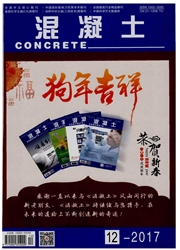

 中文摘要:
中文摘要:
通过正交试验法研究了砂率、水胶比、设计孔隙率和增强剂掺量4个因素对透水混凝土抗压强度、抗折强度、透水系数、孔隙率等性能的影响以及透水系数与抗压抗折强度的关系,优选出配合比。结果表明:砂率和设计孔隙率对透水混凝土抗压强度、抗折强度、透水系数影响大,增强剂和水胶比影响次之;随着砂率的提高透水混凝土强度逐渐增大,透水系数逐渐下降;随着设计孔隙率的增大,强度逐渐降低,透水系数逐渐增大。当砂率在2%~4%、孔隙率在18%~20%、增强剂掺量在5%时,透水混凝土的强度与透水系数达到较优状态;通过试验数据的回归分析,分别建立了透水系数与抗压强度、抗折强度的关系式。
 英文摘要:
英文摘要:
By the method of orthogonal experiment, it were studied the influences of four factors, such as sand rate, water-binder ratio, designed porosity and microsilica volume, on compressive strength, bending strength, permeable coefficient, porosity of permeable con- crete and the relations between permeable coefficient and compressive and bending strength were also investigated in this method, and the optimal mix ratio was obtained.The results show that sand rate and designed porosity have a prior effect on compressive and bending strength and permeable coefficient of permeable concrete, while water-binder ratio and microsilica volume have less impacts on those per- formances.With the increase of sand rate, the strength of permeable concrete increases gradually, and the permeable coefficient decreases gradually.With the increase of designed porosity, the strength of permeable concrete decreases gradually, and the permeable coefficient in- creases gradually.When sand rate is between 2% and 4% ,porosity is 18%~20% ,and enhancer amount is 5% ,the strength and permeable coefficient of permeable concrete reach its optimal state.The formulations of permeable coefficient and compressive strength, and bending strength are respectively established according to the regression analysis of experimental data.
 同期刊论文项目
同期刊论文项目
 同项目期刊论文
同项目期刊论文
 期刊信息
期刊信息
